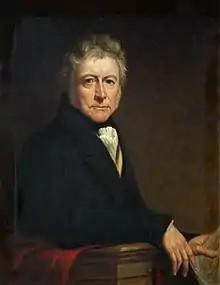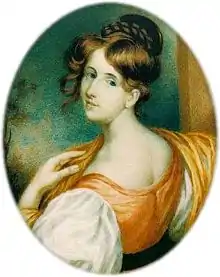William John Thomson
William John Thomson RSA (1771–1845) was an American-born painter of silhouettes, portraits and miniatures who was active in Great Britain.[1]
William John Thomson | |
|---|---|
 Self-portrait, Royal Scottish Academy | |
| Born | William John Thomson 3 October 1771 Savannah, Georgia, U.S. |
| Died | 24 March 1845 (aged 73) Edinburgh, Scotland |
| Occupation(s) | Painter and miniaturist |
| Spouse |
Helen J. Colhoun (m. 1797)Anne McCulloch (m. 1817) |
| Children | 7 |
Early life
Thomson was born in Savannah, Chatham County, Georgia, on 3 October 1771 to Scottish parents, Alexander Thomson and Mary Elizabeth Thomson née Spencer. Thomson's first sister Margaret was born in 1773, his second sister born in 1775 was Catherine Thomson, later the stepmother of Elizabeth Gaskell. They migrated to England during the war of independence. His younger brother born in Edinburgh in 1778 was Anthony Todd Thomson the doctor who had delivered Gaskell.[2] He moved to London and learned to paint. He exhibited at the Royal Academy of Arts in 1795.[3] He married Helen J Colhoun in Edinburgh 12 May 1797,[4][5] He was considered for election to the Royal Academy in 1808[6] He exhibited his work at The British Institution between 1809 - 1829 whilst living in London at 6 Charles Street, 41 Craven St and 111 The Strand. In Edinburgh at 59 York Place and Northumberland Avenue.[7] In 1812 he moved back to his ancestral home of Scotland and settled in Edinburgh. About 1817 he marries Anne McCulloch (d.1855). The two marriages produce seven children. After marriage they lived at 20 Dundas Street in the New Town.[8]
Painting style

Thomson worked in a solemn, realistic, somewhat simplified style, devoid of the affectation that often characterised the work of his contemporaries. His subjects face slightly to the right; their features are emphatically delineated, the left eye appearing overly large. A pink tonality suffuses the paintings, reddish brown shading models the forms and brown hatching often makes up the background.[9] Thomson was a miniaturist of very great eminence, although he sometimes exercised his talents on large portraits and small full-lengths. To accuracy of execution he added great richness of effect, preciousness of finish, and depth of tone.[10]
Latter years
He became a prominent figure in the artistic life of Scotland, holding a variety of official positions. He exhibited portraits, miniatures, landscapes and genre paintings.
On 16 July 1823 his younger brother Anthony Todd Thomson submitted a request to Robert Dundas, 2nd Viscount Melville that Thomson succeeds the late Sir Henry Raeburn as the King's Limner for Scotland, (the post was given to David Wilkie ).[11]
On 17 April 1824 he was elected Associate Member of the Institution for the Encouragement of Fine Arts in Scotland which later became the Royal Scottish Academy.[12]
On 7 October 1829 he was elected academician of Royal Scottish Academy and is shown on their alphabetical list.[13]
In 1831 as trustee to the estate of Hugh William Williams (Artist) along with Mrs Robina Williams, Aeneas MacBain WS, he organised a studio sale.[14]
In June 1832 he painted a miniature of his step niece Elizabeth Gaskell see below.[15] (née Stevenson) author of Cranford.
In 1834 and 1835 he was a director of the Caledonian Insurance company alongside Henry Raeburn.[16]
He lived at 47 Northumberland Street, Edinburgh in the 1830s until he died on 24 March 1845[17] He is buried at St John's Episcopal graveyard in Edinburgh. The grave lies on a south-facing wall at the west side of the lower terrace. His wife and children lie with him.
The memorial to his parents and grandparents is in Canongate Churchyard.
Family
He was married to Anne McCulloch (1783-1855).[18]
Examples of his miniaturist and portraiture work
 Sir Walter Scott memorial locket. A private commission 1832.
Sir Walter Scott memorial locket. A private commission 1832. Elizabeth Gaskell in Edinburgh June 1832.
Elizabeth Gaskell in Edinburgh June 1832. Musidora Circa 1836. Royal Scottish Academy of Art and Architecture.
Musidora Circa 1836. Royal Scottish Academy of Art and Architecture. Mrs H J Thomson and her son James born 8 Mar 1798. Royal Scottish Academy of Art and Architecture.
Mrs H J Thomson and her son James born 8 Mar 1798. Royal Scottish Academy of Art and Architecture. Portrait of an English officer - Finnish National Gallery
Portrait of an English officer - Finnish National Gallery
Many of his works can be found in The Royal Scottish Academy, 1826-1916; a complete list of the exhibited works by Raeburn and by academicians, associates and hon. members, giving details of those works in public galleries Pages 398 - 401.
References
- British Miniaturists by Basil Somerset Long. 1929.
- The Oxford National Biography https://doi.org/10.1093/ref:odnb/10434. accessed 5 Nov 2018
- American Portrait miniatures in the Manney collection by Dale T Johnson page 213
- Elizabeth Gaskell: The Early Years – John Chapple page 474 para 18.
- Her portrait with their son held by the Royal Scottish Academy and shown in the Art UK website is shown below.
- British Miniaturists by Basil Somerset Long. 1929. British Library, retrieved 23 Aug 2018
- Algernon Graves 1908 The British Institution accessed 29 Jan 2023
- Edinburgh Post Office Directory 1820
- American Portrait miniatures in the Manney Collection By Dale T Johnson page 213
- Art in Scotland By Robert Brydall 1889 page 245-6
- National Records for Scotland, Papers of the Dundas family, reference GD51/6/2195
- Caledonian Mercury Mon 19 April 1824 p.3 accessed 27 August 2023
- "ROYAL SCOTTISH ACADEMICIANS | Royal Scottish Academy of Art and Architecture".
- The Life and Works of Hugh William Williams by J Rock Vol 1 p8.
- An Elizabeth Gaskell Chronology by G Handley p.25
- Edinburgh Post Office annual Directory 1805-1834 p.306 accessed 27 August 2023
- *Grays Directory 1832–33 page 196
- Thomson grave, St John's churchyard
Further reading
- The Royal Scottish Academy, 1826–1916. A complete list of exhibited works.
- British Miniaturists by Basil Somerset Long. 1929.
- The Royal Scottish Academy exhibitors 1826–1990. A dictionary of artists.
- Profiles of the Past: William John Thomson
- Art UK: William John Thomson
- Philip Mould Historical Portraits Image Library
- Ellison Fine Art: fine portrait miniature specialist
- Genealogy of W J Thomson see p.10.